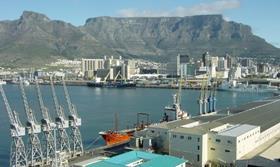
My first impression of South Africa is that it has the most welcoming climate you could possibly wish for after months of greyness and rain in the UK.
It is sweltering when the wind drops, the unseasonably strong ‘black south-eastern’ wind blowing ever since we arrived, making the weather breezy and beautifully hot. Perfect conditions for laundry, you might say – and, of course, growing stone fruit.
In actual fact, the wind is slightly stronger than growers would wish for, and there have been some murmerings that if it keeps up, cranes working at Cape Town Port, where produce is shipped from, may well be suspended.
Yesterday morning (24 February), we went to trade body Hortgro’s offices for an introductory presentation in the town of Paarl. It was interesting to learn why the exchange rate of South African rand is such a sensitive issue, affecting both input costs and returns to farmers (the upcoming elections in May making the currency particularly unstable at the moment).
Varietal developments, including the low-yielding but popular ‘plucot’, and an update on a forward-thinking and unique ethical trade initiative, were interspersed with live tweet updates from blogger Kerstin Rodgers, who was fielding questions from British consumers.
Looking round the immaculate worker-houses and facilities on the Babylonstoren Estate, owned by a Cape Town media mogul, it seemed a world away from the reports of strikes in 2012 and last November.
The plum farm and winery provides its permanent workers with a crèche, free transport, free housing and a pension scheme, and appears to be far removed from the townships and shocking unemployment figures. It is hard to tell whether it is a model enterprise for aspirational industry standards or an unattainable anomaly.
We're off to a community centre this morning (25 February), followed by a visit to TruCape and CFG. In the evening, we will be treated to a ‘braai’ (barbecue).






No comments yet